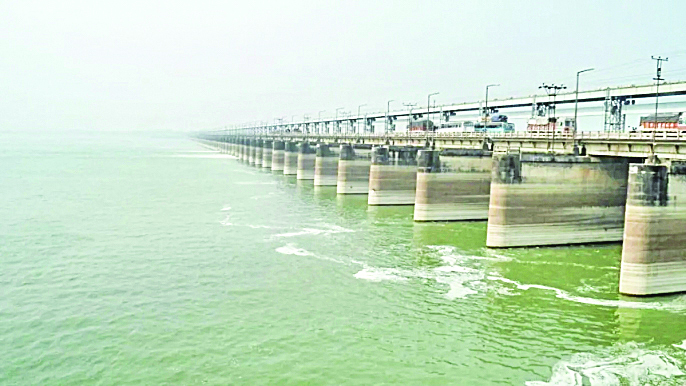India’s suspension of the Indus Waters Treaty raises concerns over water-sharing commitments with Bangladesh.
NEW DELHI: In response to the recent terror attack on tourists in Pahalgam, Kashmir, India has decided to suspend the Indus Waters Treaty with Pakistan, heightening tensions between the two countries. This development has also raised concerns in Bangladesh, where there are growing fears that India might use water-sharing as a tool of political leverage. These concerns are particularly significant as the IndoBangladesh Ganga Water Treaty is set for renewal in 2026. “With the Ganga Treaty up for renewal next year, India’s suspension of the Indus Waters Treaty could cast doubts on its commitment to watersharing with Bangladesh,” noted water expert Nutan Manmohan. Uttam Sinha of the Manohar Parrikar Institute for Defence Studies and Analyses (IDSA) added, “While India has traditionally respected water-sharing arrangements with its lower riparian neighbours including through the Ganga Treaty the success of future negotiations will largely depend on the prevailing political climate.” Tensions between India and Bangladesh have escalated following controversial remarks by Muhammad Yunus, Bangladesh’s interim Chief Adviser, advocating for increased Chinese involvement in India’s sensitive Northeast region. In response, India revoked Bangladesh’s transshipment facility for export cargo, effective April 8, 2025. The decision also coincides with Bangladesh’s plans to develop a strategic base near the Siliguri Corridor in collaboration with China, including the revival of the Lalmonirhat air base. Under the interim leadership of Yunus who has distanced his administration from many of the Hasina government’s policies Bangladesh has drawn closer diplomatically to both China and Pakistan. In a rare development, Pakistan and Bangladesh recently held Foreign Secretary-level talks in Dhaka, aimed at paving the way for a visit by Pakistani Foreign Minister Ishaq Dar. However, the visit was postponed amid rising India-Pakistan tensions, particularly after Dar’s controversial remarks referring to the perpetrators of the Pahalgam massacre as “freedom fighters.” The renewal of the IndoBangladesh Ganga Water Treaty has remained a key topic in recent bilateral engagements between the two countries. It was prominently discussed during Prime Minister Sheikh Hasina’s visit to India in June 2024—her final state visit before the political upheaval in July-August 2024 that led to her departure from office. Since then, the interim government led by Yunus has continued the dialogue on the treaty. On March 6, 2025, technical teams from both nations convened in Kolkata under the Joint Rivers Commission to specifically discuss the treaty’s renewal. During the visit, the Bangladeshi delegation also inspected the joint observation station at Farakka. The Indo-Bangladesh Ganga Water Treaty, originally signed on December 12, 1996, by Indian Prime Minister H.D. Deve Gowda and Hasina during her first tenure, guarantees a minimum flow of water to Bangladesh during lean seasons. Spanning three decades, the treaty is set for renewal in 2026, subject to “mutual consent.” As Manmohan observed, “While the treaty is up for renewal next year, India’s ongoing suspension of the Indus Waters Treaty may raise doubts about its commitment to sharing river waters with Bangladesh.” Sinha told The Sunday Guardian that the Ganga Treaty is a cornerstone of India-Bangladesh relations, providing a structured framework for water-sharing. Article XII of the 1996 treaty states, “This Treaty shall enter into force upon signature and shall remain in force for a period of thirty years, and it shall be renewable on the basis of mutual consent.” Importantly, the renewal is not automatic. Mutual consent requires an agreement or understanding between both parties. Either side may choose not to renew the treaty if they deem it unnecessary. India has historically supported water-sharing arrangements with its lower riparian neighbours, and the Ganga Treaty reflects this approach. However, it is undeniable that effective dialogue on its renewal will depend on the prevailing political dynamics. India prefers engaging with a democratically elected government in Bangladesh, and it is hoped that the current interim government will move toward that direction. Nevertheless, India remains committed to continuing the dialogue. In March, a Bangladeshi delegation visited India for the 86th Joint Committee of Technical Experts meeting— the first since Hasina’s electoral defeat. The discussions focused on the renewal of the Ganga Treaty and the sharing of other rivers, including the Teesta and Feni. While political factors may influence the pace of negotiations, both nations must prioritise cooperative basin management to ensure water security, protect ecosystems, and support the livelihoods of riparian communities. Manmohan noted that the topography of eastern India differs significantly from that of the western region. While the west faces water scarcity, the east deals with an abundance of water. Harnessing the vast rivers of the east presents a much greater challenge due to their volume, but they also offer transformative possibilities. According to her, it could be possible to address the long-standing issue of burning coal mines in Bihar and Jharkhand, where persistent underground fires could potentially be extinguished using surplus water. Ideally, a comprehensive and visionary plan would involve channelling this excess water through large pipelines to create substantial reservoirs in the arid regions of central India. These man-made “sagars” could help rejuvenate barren plateaus and restore life to the water-deprived ecosystems of central India.

